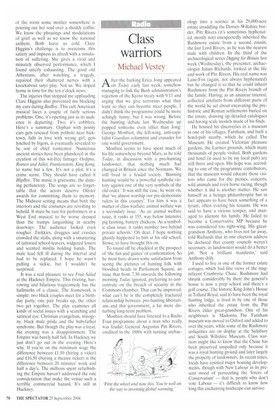Class warriors
Michael Vestey
fter the barking Erica Jong appeared on Today early last week, somehow managing to link the Bush administration's rejection of the Kyoto treaty with 9/11 and urging that we give terrorists what they want so they can become nicer people, I didn't think the programme could be more achingly funny; but I was wrong. Before the hunting debate last Wednesday up popped someone even sillier than Jong: George Monbiot, the left-wing, anti-capitalist Guardian columnist and crusader for one world government.
Monbiot seems to have spent much of his life somewhere beyond Mars, as he told Today, in discussion with a pro-hunting landowner, that nothing much had changed in Britain since the Normans. We still lived in a feudal society. 'Banning hunting would be a powerful symbolic victory against one of the very symbols of the old order.' It was still the case, he went on, that 'we almost worship our pre-democratic rulers in this country'. For him it was a matter of class warfare; animal welfare was a secondary issue. 'As an animal welfare issue, it ranks at 155, way below intensive pig farming, battery chickens. As a symbolic class issue, it ranks number two behind private schools.' Oh dear, I hope nothing ghastly happened to him at his old school, Stowe, to have brought this on.
To round off he chuckled at the prospect of 'the fun and games' of confrontation. So he must have drawn some satisfaction from seeing the pictures of hunting folk with bloodied heads in Parliament Square, an issue that from 7.30 onwards the following morning Today ignored, preferring to concentrate on the breach of security in the Commons chamber. That can be improved; what can't be is the completely fractured relationship between pro-hunting libertarians and this government, a far more disturbing long-term problem.
Monbiot should have listened to a Radio Four programme about a man who really was feudal: General Augustus Pitt Rivers, credited in the 1880s with turning archae ology into a science at his 29.000-acre estate straddling the Dorset–Wiltshire border. Pitt Rivers (it's sometimes hyphenated, mostly not) unexpectedly inherited the Rushmore estate from a second cousin, the last Lord Rivers, as he was the nearest male with children. In the third of the archaeological series Digging for Britain last week (Wednesday), the presenter, archaeologist Julian Richards, looked at the life and work of Pitt Rivers. His real name was Lane-Fox (again, not always hyphenated) but he changed it so that he could inherit Rushmore from the Pitt Rivers branch of the family. Having, as an amateur interest, collected artefacts from different parts of the world he set about excavating the prehistoric and Roman settlements buried on the estate, drawing up detailed catalogues and having scale models made of his finds.
He housed his discoveries in a museum in one of his villages, Farnham, and built a hotel-pub nearby, which he called The Museum. He created Victorian pleasure gardens, the Larmer grounds, which many thousands of people visited, Both gardens and hotel (it used to be my local pub) are still there and open. His hope was, according to one of the programme contributors, that the museum would educate those visitors who came for the picnics, concerts, wild animals and even horse racing, though whether it did is another matter. He saw himself as a benign philanthropist but in fact appears to have been something of a tyrant, often evicting his tenants. He was said to have a vicious temper, and managed to alienate his family. He failed to become a Conservative MP because he was considered too right-wing. His greatgrandson Anthony, who lives not far away, told Richards that in one election address he declared that county councils weren't necessary, as landowners would do a better job. 'Not a brilliant manifesto,' said Anthony drily.
I used to live in one of the former estate cottages, which had fine views of the magnificent Cranborne Chase. Rushmore had shrunk considerably by then; the general's house is now a prep school and there's a golf course. The historic King John's House at Tollard Royal, said to have been the royal hunting lodge, is lived in by one of those who inherited the estate from the Pitt Rivers elder great-grandson. One of his neighbours is Madonna. The Farnham museum was moved to (Word and added to over the years, while some of the Rushmore antiquities are on display at the Salisbury and South Wiltshire Museum. Class warriors might like to know that the Chase has been preserved unspoiled only because it was a royal hunting ground and later largely the property of landowners. In recent times, locals have resisted major housing developments, though with New Labour in its present mood of persecuting the 'forces of Conservatism' — that is, people who don't vote Labour — it's difficult to know how long this enchanting landscape can survive.


























































































 Previous page
Previous page